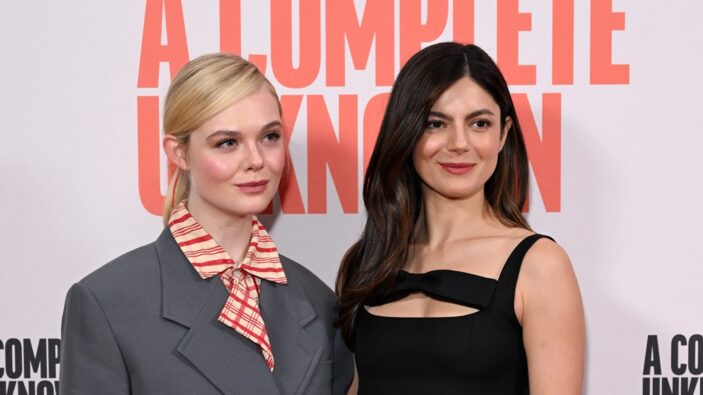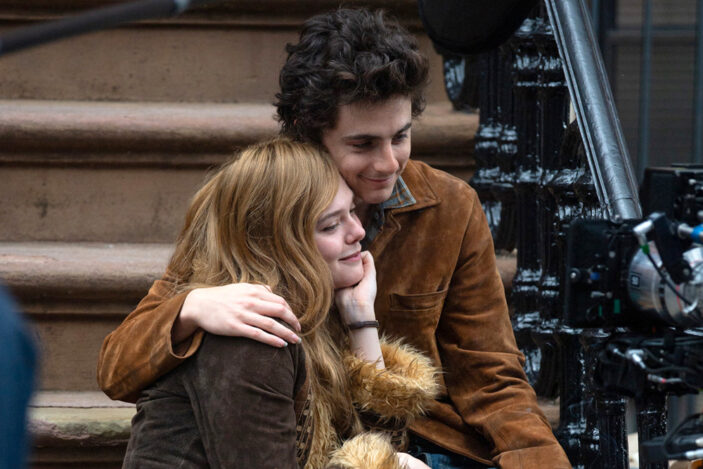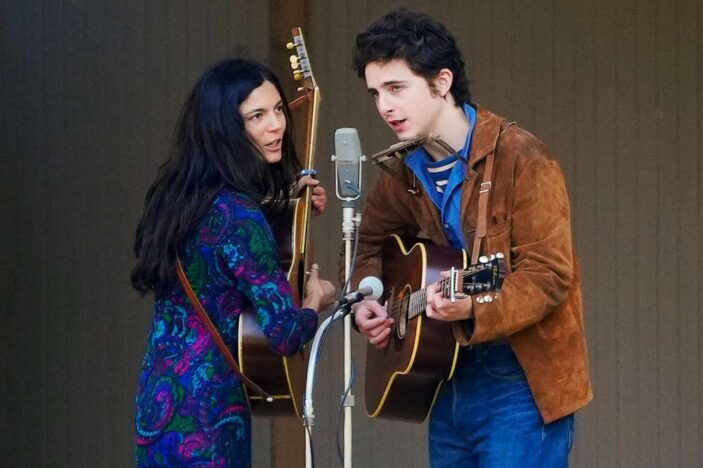
In the early 1960s, 19-year-old Bob Dylan arrives in New York with his guitar and revolutionary talent, destined to change the course of American music. Forming his most intimate relationships during his rise to fame, he grows restless with the folk movement, making a controversial choice that reverberates worldwide.
Bringing Dylan’s specific story to the big screen for all to uncover his unique enigma of a personality, James Mangold has crafted A Complete Unknown, with Timothée Chalamet delivering career-finest work as the mysterious musician.
As the film arrives in Australian theatres this week, Peter Gray spoke with the lead creatives of the film, including actresses Elle Fanning and Monica Barbaro, who, respectively portray, two of the main women orbiting Dylan’s personal and professional life – Sylvie Russo, a character based on his girlfriend at the time, Suze Rotolo, and folk music legend Joan Baez, who was one of the first musicians to record Dylan’s music, leading to a tumultuous relationship between the two.
Here, the two discuss their relationships to Dylan’s music, how it felt to portray real-life people, and how they interpret the film’s themes of identity.
Elle, what does an artist like Bob Dylan mean to you? Was he someone you grew up listening to?
Elle Fanning: I know this is going to sound fake, but this is so crazy that it’s real, but I was introduced to Bob Dylan through Cameron Crowe. I did a movie with him when I was 13, and he would play music on set constantly. And he played the song “Buckets of Rain” over and over again on that set. And so I’m 13, I didn’t know (Dylan) was, and I’d ask who it was, because I loved the song. So Cameron introduced me to him. And then I would write Bob Dylan in cursive on my hand every single day in middle school. I wasn’t allowed posters of Bob Dylan on my wall, but I had a cork board, and it was pretty much filled with Bob Dylan (laughs). It was a shrine to him. So, I honestly feel like I manifested getting this part, because I was a real fan growing up. I mean, I still am (a fan), but it was pretty special when I got that call.
I am just going to say, there’s a young Michelle Pfeiffer quality to your performance here. I loved it.
Elle Fanning: Oh, thank you. That means a lot. I’m about to work with her again. I’ve already worked with her, but she’s going to play my mom in something soon.
I wanted to ask, for you, was there a balance in approaching any historical accuracy of Suze Rotolo? Or of her within your own artistic interpretation of Sylvie?
Elle Fanning: Sylvie is really not a fictionalized character in the movie. I mean the only thing that is fictionalized is just her name, which was changed at the request of Bob himself, because she has since passed away and she was never a public figure. She was very private. And that’s something we see filtered into the relationship throughout the movie. She wasn’t built for the world that Bob catapulted her into. It’s interesting, because I read that she wrote novel called “A Free Will in Time”, and it was a lot about herself growing up in the 1960s in the West Village, and it touched on mostly their relationship. But I don’t really know what happened. I mean, she wasn’t in Newport in 1965, so I think a few dates (in the movie) are switched around, but they are so for the trajectory of their relationship. That arc is very true to what it was, but I felt like I had a big responsibility there.
Because, knowing that Bob himself, who I have not met or spoken to, but knowing that she was so sacred to him and so precious, there was always, subconsciously in my mind, that thought that if he ever sees this (film) one day, I would hope that I have honoured her, or captured an essence of what they had. Timmy and I talked about that a lot. In many ways, she was the only person that really knew him and loved him for the boy from Minnesota that he was. We see in that last scene, that she’s the last person that he has to let go.
Sylvie believes that identity is tied to personal history, and she laments when she tells Bob that she feel like she doesn’t know him because he hasn’t shared any personal details of his history with her. Whereas Bob believes that you create your own identity. What does identity mean to you?
Elle Fanning: So interesting. I know Sylvie is really seeking the truth. I think she’s really after that. I can go both ways with it, because I think as an actor and growing up in this industry, I feel like I’ve probably created an identity for myself subconsciously. Sometimes you have to protect certain parts of yourself. You have to keep it private for the better of yourself. I think that there’s something to that that is needed. Like, in a world where people “know you”, I find it funny that in press conferences or interviews you see with Bob from that time, he played with the press. He just filled in the blank and messed with everyone, which I actually find quite funny, because I think he felt like, “Well, people are already asking the questions. They’ll fill in the blank anyway, so why not tell them something that maybe isn’t true? And then I’ll be this mystery.” I understand what he was trying to do.
I think, as an artist, there’s something about being free of the fast and being free to be whoever you want to be. Cliche as it sounds. It’s important, and I think what Jim (James Mangold) has done so beautifully is tell a story of an artist so completely. He turned his back on what he knew to go into the future and step outside the box, and, you know, be free again. Everyone was telling him not to do that, but thank God he did, because he really changed the course of music forever. I think it’s important that we allow people to change. I think that’s what I take away. Identity is who we are. Is it the people around us that tell us who we are? Is it us who tell us who we are? Bob touched all the characters here, and they are all creating his identity, you know? And he’s trying to get out of that.

And going from that, did your perspective on Dylan as a person or an artist personally change having done this film?
Elle Fanning: That’s a big one. I mean, I wouldn’t classify myself as like a Dylanologist of knowing all the tours and dates and all that, but I think my respect for him, of what he did, from 1961 to ’65, as well as throughout his career, that admiration grew so much. (As I said earlier) the way he would toy with everyone and create that elusiveness. I don’t know if I’m brave or bold enough to do that, but it makes me want to.
Monica, what was it about Joan Baez that intrigued you and drew a connection to? And have you met Joan or heard from her regarding this performance?
Monica Barbaro: I did speak with Joan. I was so absorbed in all elements of her life, and just so completely obsessed with her. The music, every memoir, every interview. (But) it can be a risky thing to speak to someone, because maybe they’ll tell you something that is not necessarily useful or gets in your head. She’s such an honest person, but she’s kind and I kept having dreams about her. Specifically, dreams about meeting her. They always went really well, and we had a great time, so I think my subconscious was telling that it was okay to reach out. It felt like a very Joan thing to do. To reach out. To be bold enough to just get on the phone with her. So I did, and we spoke, and just hearing her voice over the phone was one of the most…I mean, I’ll never forget that for as long as I live. It felt emotional. It felt immense to me as part of the process.
She told me she was hoping that I would reach out. So I just felt very validated in that decision, and I felt like some part of me understood her. That sort of solidified it for me, that I was on the right path. And then I performed “Don’t Think Twice It’s Alright” the next day, which was my first live singing and playing guitar performance in front of a live audience, and something shifted in that 24 hours where I had paid homage. I then felt like I could go forth and create.

In studying her, was there anything that really stuck with you? That you most admire about her?
Monica Barbaro: I just love her honesty. I think she’s always been very candid about herself. It’s not one of those things where you feel like someone’s trying to save face, so they’re hiding a version of themselves from you. When you read her memoirs, she’s honest about herself. She talks about the things she’s done, and not in a regret kind of way. Maybe, depending on the topic, there might be a bit of (regret), but she’s like, “This is what I did and this is why.” And that’s very helpful when you’re portraying someone, because you don’t feel like you have to weed through answers to arrive at something real to play. But it’s also just a wonderful quality as a person. She’s frank and she’s direct. But she cares. She’s a humanitarian. I just really admired that she’s unashamed.
The film explores themes of reinvention and identity. How do these themes resonate with you, personally or professionally?
Monica Barbaro: Oh, I mean, it’s incredibly difficult when you’re well known in any way. I mean, even personally, it’s very hard to reinvent yourself or to behave in a way that people don’t expect you to. To overhaul your life, to change is difficult for a lot of people. I think one of the most difficult things about change is actually not even so much changing you own behaviour, but dealing with the repercussions of that behavioural change. I was talking about this with a friend recently, (that) you establish boundaries, and more difficult than saying no is experiencing someone that you love receive no for the first time and how they handle it.
I guess on a personal life, but professionally (too), I couldn’t be in a better space with this cast. And James Mangold is constantly changing. I mean, Walk the Line, Logan, Girl, Interrupted. He has these wildly strong pivots in genre. 3:10 To Yuma? Come on! That’s really cool that he’s able to do that, and he’s so well respected in the industry. I think that’s really incredible. And it makes sense that this be the story that he wants to tell. All that he identifies with this part of Bob’s life is such a really cool thing to study. It’s like the identity throughline in his filmmaking is the same way that Spielberg talks about families breaking up in every film.
But it’s hard to pivot. It’s hard to keep it fresh. It’s hard to give some people something that they don’t expect. Timmy, also. I mean, Call Me By Your Name and Dune? Wildly different. I think it’s a gift to explore and it’s hard work to convince the industry and the audiences that you can do more than one trick. So, I think it’s a very valuable thing to pursue. But a challenge, for sure.
A Complete Unknown is screening in Australian theatres from January 23rd, 2025.
